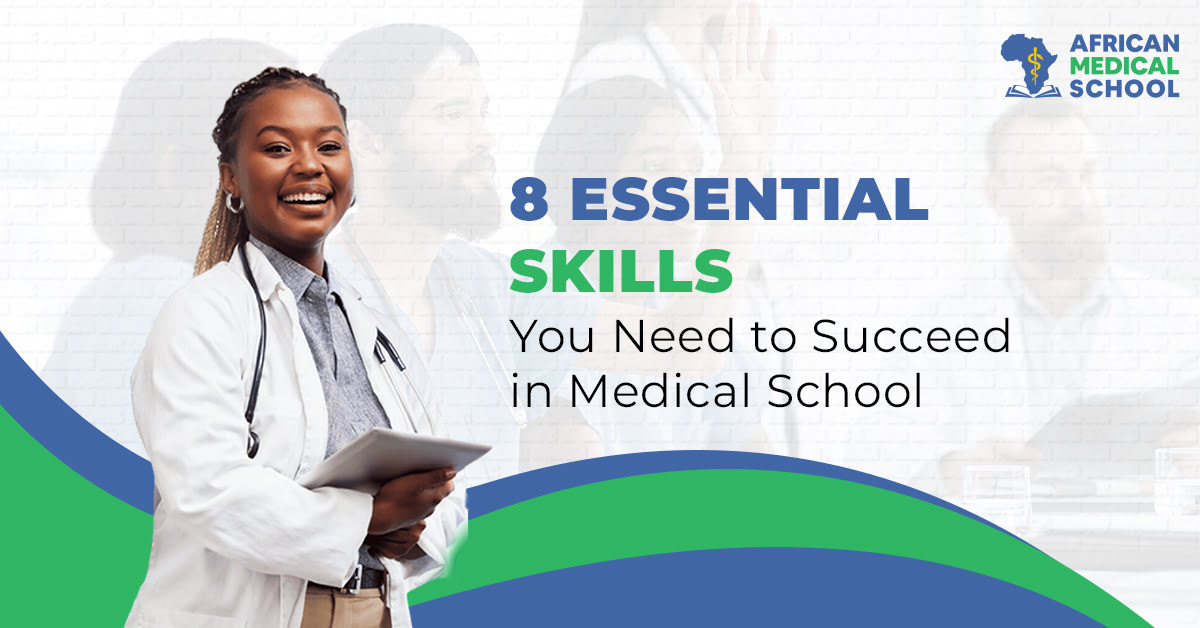|
|
Blog Summary
- Introduction
- The Importance of Medical School
- Strong Academic Foundation
- Effective Time Management
- Exceptional Communication Skills
- Critical Thinking and Problem-Solving
- Resilience and Stress Management
- Teamwork and Collaboration
- Empathy and Patient-Centered Care
- Continuous Learning and Adaptability
- Conclusion
- FAQ
Introduction
Entering medical school is a challenging yet rewarding journey that demands a unique set of skills. In this article, we will explore the eight essential skills you need to survive and excel in medical school. These skills go beyond academic prowess and touch on the personal and professional qualities that make a successful medical student. Whether you are a prospective medical student or currently navigating the rigorous curriculum, understanding, and developing these skills can be the key to your success in medicine.
From effective time management to empathetic patient communication, we will delve into the attributes that will help you become a skilled and compassionate healthcare professional.
The Importance of Medical School
Medical school plays a pivotal role in shaping the future of healthcare professionals. It is the foundational step in one’s journey toward becoming a competent and compassionate medical practitioner. In the realm of healthcare careers, medical school stands as the gateway to acquiring the knowledge, skills, and clinical expertise required to make a meaningful impact on patients’ lives. Through rigorous training and comprehensive education, medical school equips students with the foundation they need to embark on a successful medical career.

The demanding coursework, practical experience, and exposure to a wide range of medical disciplines set the stage for future doctors to diagnose, treat, and contribute to the well-being of their patients. Attending one of the best medical schools in Africa can provide students with a solid foundation and rigorous training, setting them on the path to becoming competent and compassionate healthcare professionals.
Strong Academic Foundation
A strong academic foundation is the cornerstone of a successful journey through medical school. It is the academic rigour and excellence that sets the stage for aspiring medical professionals. To excel in pre-med courses, students must not only grasp the subject matter but also cultivate effective study habits and time management skills. Maintaining a high GPA is not just a testament to your academic prowess but is often a critical factor in securing admission to medical school. Admissions committees scrutinize GPA scores, making it essential for prospective medical students to strive for excellence in their undergraduate studies consistently. Building a robust academic background does not just open doors to medical school; it’s your ticket to a rewarding medical career.
Effective Time Management
In the fast-paced world of medical school, effective time management is not just a valuable skill; it is an absolute necessity. The demanding nature of the medical school curriculum can overwhelm even the most dedicated students. To succeed in this rigorous environment, students must manage their time efficiently.
Prioritize tasks: Identify the most critical and urgent tasks in your daily or weekly schedule. This could include studying for exams, attending classes, or completing assignments. Prioritizing your tasks ensures that you focus your energy on what matters most.
Create a study schedule: Develop a well-structured program that allocates dedicated time for different subjects and topics. Use digital tools, such as calendar apps, to set reminders and stay on track.
Avoid multitasking: While it seems like a time-saving approach, multitasking can reduce productivity and quality of work. Focus on one task at a time to maximize your efficiency.
Seek time management resources: Medical schools often provide workshops, seminars, or online resources. Take advantage of these opportunities to gain experience in effective time management techniques.
Utilize time management apps: Multiple apps help students organize their schedules and tasks. Popular options include Trello, Todoist, and Google Calendar. Experiment with these apps to find the one that best suits your needs.
Exceptional Communication Skills
Effective doctor-patient communication serves as the cornerstone of a successful healthcare journey. When doctors and patients engage in open, empathetic, and transparent conversations, the treatment process becomes more efficient and patient-centred. For instance, a doctor’s ability to actively listen to a patient’s concerns, provide understandable explanations of medical conditions, and address questions with patience can significantly enhance the patient’s trust and compliance. But how can one improve their communication skills in this context? Developing active listening techniques, such as maintaining eye contact and asking open-ended questions, can help healthcare professionals create a supportive and understanding environment.
Additionally, practicing empathy, using plain language, and seeking feedback from patients are effective ways to continually refine communication skills, ensuring that both doctors and patients can effectively collaborate for better health outcomes.
Critical Thinking and Problem-Solving
Critical thinking is a paramount skill in the realm of medical practice. It is not just about memorizing facts and figures; it’s about the ability to analyse complex situations, make informed decisions, and provide the best possible care to patients. Medical professionals often face intricate cases and diagnostic challenges where the stakes are high. You can effectively navigate these scenarios by strengthening your critical thinking skills. Consider engaging in exercises and problem-solving activities that imitate real-life medical circumstances to improve your thinking skills. These exercises can help you develop a systematic approach to diagnosing and treating patients.
In the context of healthcare education in Africa, fostering critical thinking skills is essential for medical students to navigate complex cases and diagnostic challenges effectively, enabling them to provide the best possible care to patients.
Resilience and Stress Management
In the demanding world of medical school, the high-stress environment can be overwhelming for students. However, equipping yourself with effective stress management techniques is crucial for navigating this challenging journey. Resilience is a vital trait in the medical field, as it not only helps individuals endure the rigours of medical education but also prepares them to thrive in the high-pressure world of healthcare. By acknowledging the stressors, exploring stress management strategies, and understanding the significance of resilience, medical students can not only survive but also excel in their academic and professional endeavours.
Teamwork and Collaboration
Teamwork and collaboration are indispensable in medicine, where the complex nature of healthcare demands a coordinated effort. Working with a healthcare team is not important; it’s a fundamental aspect of delivering quality patient care. In a medical setting, doctors, nurses, specialists, and support staff must seamlessly combine their expertise to provide comprehensive treatment. Successful medical collaboration can be seen in cases where diverse healthcare professionals work together, like when a surgeon and an anesthesiologist collaborate to ensure a safe and successful operation. To thrive in such an environment, developing teamwork skills is essential.
Empathy and Patient-Centered Care
Compassionate healthcare providers understand that empathy is not just a trait but a skill that can be cultivated and honed. These professionals listen attentively, acknowledge their patients’ feelings, and offer support beyond the clinical aspect of treatment. For instance, stories of doctors who take the time to sit with their patients, hold their hands, and provide emotional comfort alongside medical care highlight the powerful impact of empathy. To cultivate empathy in the medical field, aspiring healthcare practitioners can engage in active listening exercises, role-playing scenarios, and training programs that emphasize the importance of understanding and addressing patients’ emotional needs.

Discover the power of empathy in healthcare and explore the ethical principles that guide healthcare professionals in our related blog, ‘7 Key Medical Ethics Principles for Healthcare Professionals‘.
Continuous Learning and Adaptability
In the fast-paced world of healthcare, staying abreast of the constant advancements and changes is not just a choice but a necessity. The ever-evolving nature of this field demands that medical students cultivate a mindset of continuous learning and adaptability. To thrive in the medical profession, it is essential to embrace new research, treatments, and technologies, which means being proactive in seeking out the latest information and learning opportunities. Whether attending conferences, participating in workshops, or subscribing to medical journals, committing to lifelong learning is a key skill.
Adaptability is equally crucial, as healthcare practices and patient needs can shift rapidly. Those who can pivot, adjust, and apply their knowledge to changing circumstances not only excel in their studies but also become the healthcare leaders of tomorrow.
Conclusion
These eight essential skills are the foundation of success in medical school. They encompass the academic, interpersonal, and adaptability skills needed to excel in the rigorous world of medicine. From a strong academic background to effective time management, communication, critical thinking, resilience, teamwork, and empathy, each skill is a stepping stone toward becoming a competent and compassionate healthcare professional. The ability to adapt and embrace lifelong learning is vital in a field that continually evolves. Whether you are a prospective medical student or currently on your medical journey, these skills will set you on the path to a fulfilling and impactful career in healthcare.



131 Comments. Leave new
https://shorturl.fm/vaDpM
https://shorturl.fm/D1Htg
https://shorturl.fm/PDPpT
https://shorturl.fm/dsBvU
https://shorturl.fm/bIxNg
https://shorturl.fm/xjlV3
https://shorturl.fm/MBKfV
https://shorturl.fm/NdQI3
https://shorturl.fm/DcPUJ
https://shorturl.fm/wvP0X
https://shorturl.fm/HDMLx
https://shorturl.fm/aQfkX
https://shorturl.fm/voPkj
https://shorturl.fm/oiFIm
https://shorturl.fm/ovrxj
https://shorturl.fm/RKBzP
https://shorturl.fm/HgbLi
https://shorturl.fm/7EexG
https://shorturl.fm/5nsuj
https://shorturl.fm/FhGcR
https://shorturl.fm/w0hH7
https://shorturl.fm/tJpHD
https://shorturl.fm/equzT
https://shorturl.fm/bSs0J
https://shorturl.fm/cvkF3
https://shorturl.fm/1HWd6
https://shorturl.fm/bNDEK
https://shorturl.fm/fhx32
https://shorturl.fm/efH4C
https://shorturl.fm/9pgML
https://shorturl.fm/zpUZD
https://shorturl.fm/dhNFI
https://shorturl.fm/csVqI
https://shorturl.fm/2apRM
https://shorturl.fm/yqMS5
https://shorturl.fm/fqe9w
https://shorturl.fm/HBW4z
https://shorturl.fm/LdnCc
https://shorturl.fm/6wZGP
https://shorturl.fm/OwzP0
https://shorturl.fm/AMdy7
https://shorturl.fm/fja3M
https://shorturl.fm/vgZu6
https://shorturl.fm/iIzIQ
https://shorturl.fm/Nacyb
https://shorturl.fm/ioLXy
https://shorturl.fm/t3IrD
https://shorturl.fm/Ysusi
https://shorturl.fm/Xmuzd
https://shorturl.fm/9TwZy
https://shorturl.fm/QLtnN
https://shorturl.fm/2lCY2
https://shorturl.fm/ZH4cn
**mindvault**
mindvault is a premium cognitive support formula created for adults 45+. It’s thoughtfully designed to help maintain clear thinking
https://shorturl.fm/xTGBc
https://shorturl.fm/5ajf9
https://shorturl.fm/q3bAX
https://shorturl.fm/o9iq7
**prostadine**
prostadine is a next-generation prostate support formula designed to help maintain, restore, and enhance optimal male prostate performance.
**sugarmute**
sugarmute is a science-guided nutritional supplement created to help maintain balanced blood sugar while supporting steady energy and mental clarity.
**gl pro**
gl pro is a natural dietary supplement designed to promote balanced blood sugar levels and curb sugar cravings.
**zencortex**
zencortex contains only the natural ingredients that are effective in supporting incredible hearing naturally.
**mitolyn**
mitolyn a nature-inspired supplement crafted to elevate metabolic activity and support sustainable weight management.
**prodentim**
prodentim an advanced probiotic formulation designed to support exceptional oral hygiene while fortifying teeth and gums.
**vitta burn**
vitta burn is a liquid dietary supplement formulated to support healthy weight reduction by increasing metabolic rate, reducing hunger, and promoting fat loss.
**yusleep**
yusleep is a gentle, nano-enhanced nightly blend designed to help you drift off quickly, stay asleep longer, and wake feeling clear.
**synaptigen**
synaptigen is a next-generation brain support supplement that blends natural nootropics, adaptogens
**nitric boost**
nitric boost is a dietary formula crafted to enhance vitality and promote overall well-being.
**glucore**
glucore is a nutritional supplement that is given to patients daily to assist in maintaining healthy blood sugar and metabolic rates.
**wildgut**
wildgutis a precision-crafted nutritional blend designed to nurture your dog’s digestive tract.
**pineal xt**
pinealxt is a revolutionary supplement that promotes proper pineal gland function and energy levels to support healthy body function.
**energeia**
energeia is the first and only recipe that targets the root cause of stubborn belly fat and Deadly visceral fat.
**boostaro**
boostaro is a specially crafted dietary supplement for men who want to elevate their overall health and vitality.
**prostabliss**
prostabliss is a carefully developed dietary formula aimed at nurturing prostate vitality and improving urinary comfort.
**breathe**
breathe is a plant-powered tincture crafted to promote lung performance and enhance your breathing quality.
**potentstream**
potentstream is engineered to promote prostate well-being by counteracting the residue that can build up from hard-water minerals within the urinary tract.
**hepato burn**
hepato burn is a premium nutritional formula designed to enhance liver function, boost metabolism, and support natural fat breakdown.
**hepato burn**
hepato burn is a potent, plant-based formula created to promote optimal liver performance and naturally stimulate fat-burning mechanisms.
**cellufend**
cellufend is a natural supplement developed to support balanced blood sugar levels through a blend of botanical extracts and essential nutrients.
**prodentim**
prodentim is a forward-thinking oral wellness blend crafted to nurture and maintain a balanced mouth microbiome.
**flowforce max**
flowforce max delivers a forward-thinking, plant-focused way to support prostate health—while also helping maintain everyday energy, libido, and overall vitality.
**neurogenica**
neurogenica is a dietary supplement formulated to support nerve health and ease discomfort associated with neuropathy.
**revitag**
revitag is a daily skin-support formula created to promote a healthy complexion and visibly diminish the appearance of skin tags.
**sleep lean**
sleeplean is a US-trusted, naturally focused nighttime support formula that helps your body burn fat while you rest.
https://shorturl.fm/N1Mtu
**memorylift**
memorylift is an innovative dietary formula designed to naturally nurture brain wellness and sharpen cognitive performance.
https://shorturl.fm/HsrSP
https://shorturl.fm/RundO
https://shorturl.fm/Ob1rk
Kado Bar Vape brings bold taste and smooth vapor to every puff. Its compact, elegant design ensures convenience, style, and premium vaping enjoyment.
https://shorturl.fm/IjymV
https://shorturl.fm/WmuR0
https://shorturl.fm/JFQS6
https://shorturl.fm/w44rs
https://shorturl.fm/tu7Ng
https://shorturl.fm/2rX3a
https://shorturl.fm/vGmzy
Interesting analysis! Seeing platforms like ph889 login game prioritize responsible gaming & mental wellbeing is a huge step forward. It’s not just about the games, but the user experience too – a comfortable onboarding is key!
https://shorturl.fm/2kcaM
Okay, so I’m trying to get into Fogo777, and having some login issues. Is anyone else having trouble with fogo777login? Help a brother out! Get logged in here: fogo777login
Been playing on winph444 for a little while now. It’s alright, got a decent variety. Could be better, could be worse. Check it out and make your own judgement: winph444.
https://shorturl.fm/dtRED
https://shorturl.fm/5wufi
That LoL match was insane! Seeing teams adapt strategies on the fly is what esports is all about. It’s cool to see platforms like jljl88 ph com embracing tech for fair gaming-transparency is key for trust in betting, right? 🔥
https://shorturl.fm/kiLir
https://shorturl.fm/YCQti
Just downloaded the 188bet app via cachvao188bet.net and it’s a game changer! So much easier to place bets on the go. Get yours: tải app 188bet
https://shorturl.fm/hoA9G
Yo galera, Egurobetbr tá mandando bem no mundo das apostas online! Tem de tudo um pouco, desde esportes até jogos de cassino. O site é fácil de usar e tem umas promoções maneiras. Visitem lá: egurobetbr.
Fun88za is a solid choice for online entertainment. They’ve got a wide selection, plus cool bonuses. Give it a look if you’re bored, you might find something you like. Let’s get started: fun88za!
Thank you so much for your wonderful and insightful share! Every word is packed with valuable thoughts and practical tips that truly broaden my horizons. I’ve gained so much inspiration and will definitely put your advice into practice soonVeo 3
Thank you so much for your wonderful and insightful share! Every word is packed with valuable thoughts and practical tips that truly broaden my horizons. I’ve gained so much inspiration and will definitely put your advice into practice soonVeo 3
Fast indexing of website pages and backlinks on Google https://is.gd/r7kPlC
Start profiting from your network—sign up today!
Promote our products—get paid for every sale you generate!
**back biome**
Mitolyn is a carefully developed, plant-based formula created to help support metabolic efficiency and encourage healthy, lasting weight management.
Chỉ với một tài khoản duy nhất tại slot365 , bạn có thể tham gia từ cá cược thể thao đến các sòng casino trực tiếp sang trọng nhất. TONY01-29O
海外华人必备的ify平台智能AI观看体验优化,提供最新高清电影、电视剧,无广告观看体验。
I don’t think the title of your article matches the content lol. Just kidding, mainly because I had some doubts after reading the article.
Alright, 98win10, let’s see what you’ve got.Always looking for a quick win. Give it a spin: 98win10. Good luck everyone!
For you footy fans, Bongda88link seems to be a place to catch up, heard from multiple sources. Gotta check it out! bongda88link
PQ88bet time! Let’s see if the odds are in our favor tonight. Give it a look see, maybe you can win big: pq88bet!
Can you be more specific about the content of your article? After reading it, I still have some doubts. Hope you can help me.
Can you be more specific about the content of your article? After reading it, I still have some doubts. Hope you can help me.
Your point of view caught my eye and was very interesting. Thanks. I have a question for you. https://accounts.binance.info/kz/register-person?ref=K8NFKJBQ
Join our affiliate family and watch your profits soar—sign up today!
Drive sales, collect commissions—join our affiliate team!
Earn passive income this month—become an affiliate partner and get paid!
ketocare I just like the helpful information you provide in your articles
Become our affiliate—tap into unlimited earning potential!
Become our partner and turn clicks into cash—join the affiliate program today!